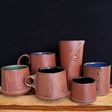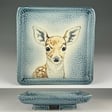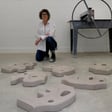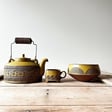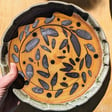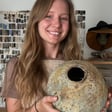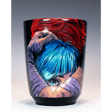
#369 How to make drippy pottery vases w/Ana Shioshita
In this insightful episode, our guest is Ana Shioshita, a multifaceted artist who balances her job in the film industry with her passion for pottery. Ana discusses her journey in pottery, starting from childhood experiences to her current work, emphasizing her love for making 'drippy' vases. She shares how working across different mediums and skills, such as woodworking and graphics, has contributed significantly to her pottery, allowing her to create unique and functional studio spaces and experiment with ceramic and wood lights. Ana talks about her reluctance to confine herself to a single style, believing that exploring various interests and ideas helps evolve her artistic voice. The episode delves into how her connection with the ocean inspires her work, leading to creations that reflect the organic movement and biological aspects of marine life. Ana also touches on the challenges of managing time between her career and pottery, and the importance of experimentation and keeping a sketchbook to record and revisit ideas. Finally, Ana encourages listeners to remain open to exploring new directions in their creative pursuits without fear. You can learn more about Ana by checking out her instagram here https://www.instagram.com/shioshita.ceramics/
The Questions we ask will determine how our pottery will look like that's why I created a Free 15 questions to help you discover your voice template go grab it here www.shapingyourpottery.com/questions
00:00 Introduction to Ana's Pottery Journey 00:48 Ana's Diverse Background and Its Impact on Her Pottery 02:14 The Early Beginnings of Ana's Pottery Passion 03:12 Rediscovering Pottery as an Adult and the Influence of Film 04:44 The Creative Process Behind Ana's Drippy Vases 07:06 Inspiration from the Ocean: Shaping Ana's Pottery 10:05 Exploring a Variety of Pottery Techniques 11:35 Finding and Managing Creative Ideas 13:35 Discovering Your Voice in Pottery 15:44 The Role of Diverse Materials in Ana's Artistic Growth 17:50 Overcoming Obstacles and Finding Your Unique Voice 20:06 Final Thoughts and Where to Learn More About Ana

